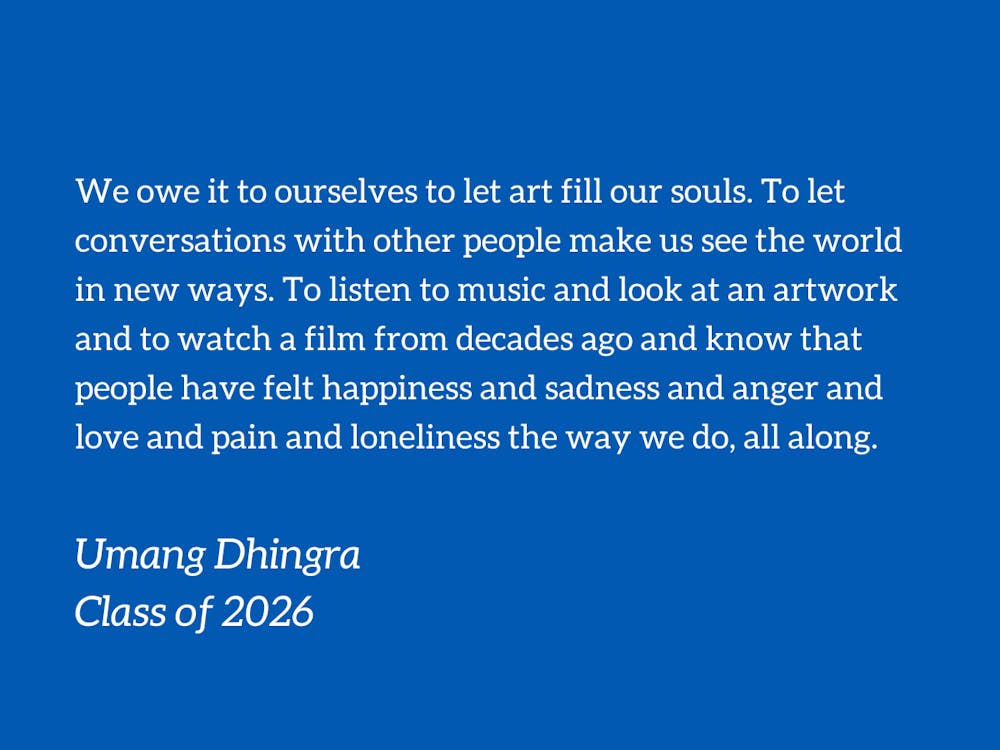In a transcript otherwise lined with intro psychology and econometrics classes, you would see some rather lovely classes I took; occasionally choosing buildings decorated with covers of books and posters of movies over the usual sleeker decor choices and flyers for consulting recruitment. The creative nonfiction class from freshman spring. A satire house course. A class about photography and American towns that I occasionally move around on my planner in DukeHub.
Like at peer institutions, more cachet is given to STEM majors than those who pursue the humanities, with more and more people pursuing careers in tech and finance after graduating from Duke. Those of us who spend our time working on problem sets instead of creative writing projects might not even consider that Duke changes immensely when you aren’t studying STEM. In fact, one might only think about the arts when it pertains to figuring out how to fulfill the ALP credit for our T-Reqs.
This article isn’t a criticism on how harmful it is that we are letting the humanities die. How we forget to recognize that statistics reduce people to numbers, that reading about lived experiences teaches us just as much, if not more, about the lives of those who came before us. How even TV shows set in universities recognize the disrespect the humanities receive. This isn’t even directed at the math major working on a problem set somewhere in Perkins right now, to convince them into throwing in a theatre minor to their degree — although if that is what floats your boat, Duke has some phenomenal faculty.
At the end of the day, this is a consideration. A plea. A request to those of us in STEM and the social sciences, to consider adding more art to our lives.
There is something truly magical about art. Something so powerful about knowing that another person’s heartbeat became color, and their breath became a word and the view from their window became the canvas in the ornate frame on the wall. Something so truly incredible about the fact that when people feel too much and think too much and life becomes too much, we resort to telling stories and sharing tiny pieces of our soul. Consider what the hallmarks of a privileged life were considered centuries ago. Days spent painting with friends over expensive wine and writing poetry in gardens or a fancy night out was theatre and opera. Although I recognize that much about life has changed, art still ultimately captures us. How an incredible photograph becomes the face of a movement. How theatre about people from centuries ago can create waves. And how, ultimately, art continues to still be a tool for, and more accessible to, the rich.
Accessing art, on campus and in the Research Triangle, is in ways still difficult. Many dance troops require a commitment of two hours thrice a week and entire weekends away for competitions multiple times a semester — things that might simply feel unrealistic to people who hold down multiple on-campus jobs to support themselves and their families. The best seats at the DPAC often go over $100 per ticket. Many cultural events in Raleigh or Charlotte are either a rather expensive Uber or a long and tiresome bus ride away.
Although there is an undeniable need to make the arts more accessible, there are ways to access them. The Nasher has free entry for students, DPAC has significantly cheaper tickets for students to some shows, not to mention on-campus options like shows by Duke Performances and Hoof ‘n’ Horn. Freewater Productions puts up free weekly movie screenings (with free concessions!) as well as free performances by Duke Players and at the Coffeehouse. If you are someone who would rather go the extracurricular route, dance teams like Duke Swing and Ballroom Dancing require significantly less time commitments, and there are numerous art magazines and student publications that accept creative work.
Some of my best memories at Duke have been at Nasher brunch on the weekends with friends after spending some time gazing at the art, conversations at night walking back to our dorms after watching a play and cheering for people I love at their acapella shows and dance performances. Life is so much better with an appreciation for art in it, even if you aren’t a skilled artist yourself. We owe it to ourselves to let art fill our souls. To let conversations with other people make us see the world in new ways. To listen to music and look at an artwork and to watch a film from decades ago and know that people have felt happiness and sadness and anger and love and pain and loneliness the way we do, all along. To let ourselves feel less alone in what we experience.
To allow ourselves to feel.
Even if you are a double STEM major who needs to take summer classes and overload every semester just to graduate on time, go to the Nasher occasionally. Ask the art history major in your economic class what you have been meaning to all along — are Monet and Manet the same person? And what is Dali on about? Catch the occasional play. Take your friends to the Gardens on a pretty morning and write poetry, even if you think it is horrible and no one will read it and you try to set it on fire as soon as you come back home. And if you have the energy to, take the house course that assigns watching "Fight Club" as homework. I promise, you will be better off for it.
Umang Dhingra is a Trinity sophomore. Her column typically runs on alternate Fridays.
Get The Chronicle straight to your inbox
Signup for our weekly newsletter. Cancel at any time.

